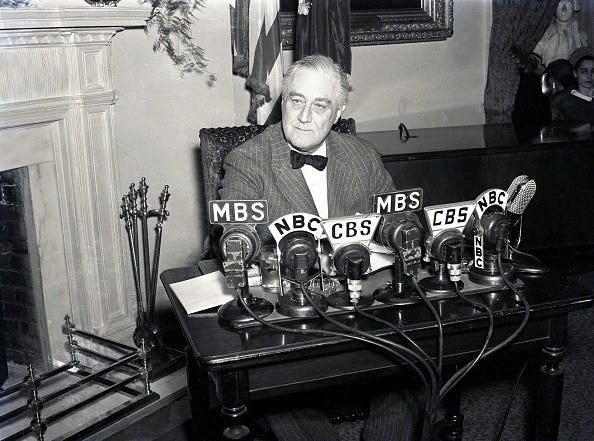Have You Taken Freedom for Granted?
A Saturday Prompt

On January 6, 1941, as war was raging in Europe, President Franklin Delano Roosevelt delivered his annual State of the Union speech to Congress. This was 11 months before Japan would attack Pearl Harbor and the U.S. would end its official neutrality and enter World War II.
But on that January day, Roosevelt vividly articulated his vision about the need to defend global democracy, fight for freedom and defeat fascism. He did not hesitate in depicting the scale of danger facing the globe and the threat to “the future and the safety of our country and of our democracy.”
“Every realist knows that the democratic way of life is at this moment being directly assailed in every part of the world—assailed either by arms or by secret spreading of poisonous propaganda by those who seek to destroy unity and promote discord in nations that are still at peace,” he asserted. “During 16 long months this assault has blotted out the whole pattern of democratic life in an appalling number of independent nations, great and small. The assailants are still on the march.”
FDR took time to explain the work underway to “change a whole nation from a basis of peacetime production of implements of peace to a basis of wartime production of implements of war.” He did not hide his desire for the military and private industry to do better in producing the billions of dollars of weapons that European allies needed—”ships, planes, tanks, guns”—to defend themselves: “I am not satisfied with the progress thus far made.”
He also quoted Benjamin Franklin to underscore that “no realistic American” can count on “a dictator’s peace” to provide security: “Those, who would give up essential liberty to purchase a little temporary safety, deserve neither liberty nor safety.”
The president succinctly described “the foundations of a healthy and strong democracy,” calling them “simple, basic things.” These included “equality of opportunity, jobs for those who can work, security for those who need it, the ending of special privilege for the few, the preservation of civil liberties for all [and] the enjoyment of the fruits of scientific progress in a wider and constantly rising standard of living.”
But the heart of this speech, which endures with great clarity to this day, is FDR’s list of “four essential human freedoms” upon which the world should be founded:
freedom of speech and expression
freedom of worship
freedom from want
freedom from fear
These are essential ingredients to the security of “a good society” in opposition to the tyranny of dictators. And as much as Roosevelt was speaking to his American audience, he understood that these freedoms are essential for the whole world. (Interestingly, the four freedoms section did not appear in his speech until the fourth draft.) You can also watch him deliver these words.
FDR concluded his address, known as the “Four Freedoms Speech,” with this:
This nation has placed its destiny in the hands and heads and hearts of its millions of free men and women; and its faith in freedom under the guidance of God. Freedom means the supremacy of human rights everywhere. Our support goes to those who struggle to gain those rights or keep them. Our strength is our unity of purpose. To that high concept there can be no end save victory.
We are living in a moment when tyranny is not a threat from a distant shore, but the constant pursuit of the man occupying our White House. Each of the essential freedoms FDR articulated are under attack as Trump and his accomplices seek to silence dissent, push white Christian nationalism, take away SNAP benefits from the hungry to fund billionaire tax cuts, and transform peaceful streets into frightening places where masked federal agents assault immigrants and citizens alike.
In a genuinely free society, we would never have to think about freedom. We could take freedom for granted. At other times, I think many fortunate—particularly white—Americans have felt free not to reflect on this question. But those times are over.
So: Have you taken freedom for granted? Do you believe that Americans are still a free people, based on the freedoms FDR described? And, as he noted, will “unity of purpose” be our strength now? What freedom are you most worried about losing? Will the pursuit of freedom still be America’s guiding light? These are big questions, but I hope you find them useful prompts.
As always, I look forward to reading your observations and the opportunity for this community to learn from each other. Please do be respectful in your remarks. Trolling will not be tolerated.
Becoming a paid subscriber to America, America—for $50 a year or just $5 a month—helps sustain our work, keeps nearly all the content free for everyone and gives you full access to our dynamic community conversations. It also represents your commitment to fearless and independent journalism.


My ancestors were enslaved. I was taught to never take freedom for granted🙏🏽
Yes. Our family’s ancestors survived the holocaust and slavery. We must resist! The fascists are starving us into submission. My partner and I were fired from our civil service careers. We had to line up at a food bank again, use the same Halloween costumes as last year for our kids, and recycle their candy to give to trick or treaters.
So many of us are struggling with DOGE and the MAGA shutdowns - any support makes a big difference: https://democracydefender2025.substack.com/p/emergency-furlough-maga-shutdown